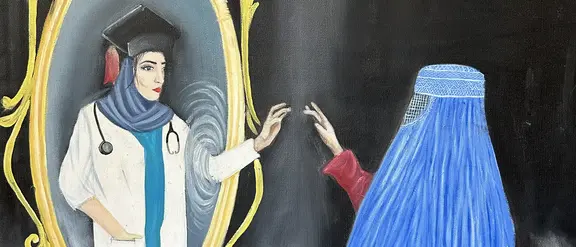Nassim had a sheltered childhood. His family came from Parwan but had lived in Kabul for a long time. His father worked for the American troops at a military vehicle repair company. His grandfather worried about the family's future: "My grandfather always said, 'One day the Taliban will come, and then it will all be over.'" But the work allowed them a good life and gave the children the chance for an education.
When his parents moved to Parwan for work with his four younger siblings, Nassim and his older sister, who was studying law, stayed in Kabul and were well cared for by their grandparents, aunt, and uncle there. "My aunt looked after me like a mother. I never felt alone." Nassim enjoyed going to school, had friends, and played sports. During school breaks, he visited his family in Parwan.
But the Taliban gained more and more power. Once, a bomb was thrown into their yard in Parwan; only by sheer luck was no one killed. His father continued working for the Americans. "He said money was the best protection, and that it was too late anyway—everyone knew who he worked for." Nassim only understood the implications of this much later. In July 2021, his father came to Kabul with the rest of the family and picked him up. Only when they drove to the Afghan-Iranian border did Nassim realize that this was an escape. And it came just in time—a few days later, the Taliban took over Herat and then Kabul as well.
They were able to hide with an acquaintance for two months, then the father made the decision to flee further: Iran was not a safe place, as there was always the threat of deportation to Afghanistan.
During their escape to Turkey, they were separated because Nassim was fitter – he could run faster and was guided across the mountains on foot at night. He was lucky, and his family also managed to cross the border after him. But Turkey wasn't safe either: anyone caught by the Turkish police was deported directly to Afghanistan. His father decided that Nassim had to try to get to Europe – the sooner, the better. The family planned to follow.
He was caught by Greek police: “They burned my things. I only had one pair of pants left. No shoes, no cell phone. Nothing.” He tried again and made it to Athens. His father sent money for the rest of his escape. After being crammed into a truck with four others for days, he arrived in Germany completely exhausted but alive.
His family wasn't so lucky. They tried to come to Greece more than ten times and failed every time. Eventually, his father gave up, but his parents want his little brother to try it alone. Nassim is torn: "I don't want him to come. He's too young, and the journey is too dangerous, especially for children. But what if my parents are right? Maybe it's better to risk his life for hope of a future than to have no hope and no life at all."
Because he knows that there are no prospects for Afghan refugees in Turkey. Sooner or later, they will be deported back to Afghanistan.
Nassim hears from friends what life in Afghanistan is like: “Everything is controlled – your clothes, your hairstyle, what you say. And where else are you supposed to go besides the mosque? There’s no work. Anyone who still has anything to sell usually pays the Taliban more in ‘stall fees’ than they can earn. If you don’t have money for food or medicine, you have to steal and are in danger of being caught and mistreated. You live in constant fear. I sometimes wonder: Are the Taliban people or devils?”
Even at home, one isn't safe or free. His friends say that at any time, a neighbor might try to protect themselves from their violence by slandering someone as an opponent of the Taliban. They don't need a reason for violence and arrests. But they always find something during house searches—a foreign phone number, the wrong movie on the laptop, music. Everyone distrusts everyone else.
His sister lives with her grandparents and her uncle's family in Kabul. She was a law student but dropped out. Now she's a midwife—the only profession women were allowed to practice, at least under strict regulations. But even midwifery training has now been banned by the Taliban. "She's a smart and courageous woman. But she's losing a lot of weight. She's suffering and afraid. I'm very worried about her."
Fear for his family and friends makes it difficult for him to concentrate and study. He is often ill. He had to cut short an internship. But he is determined to get his secondary school leaving certificate, then attend evening classes to obtain his university entrance qualification. And he clings to one hope: that the Taliban will one day disappear from his homeland.
